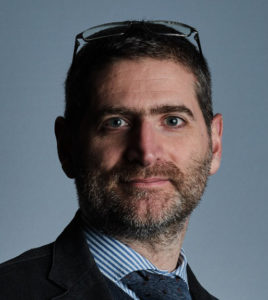 Andrea Pin is Associate Professor of Comparative Public Law, University of Padua, and Senior Fellow at the Center for the Study of Law and Religion, Emory University.
Andrea Pin is Associate Professor of Comparative Public Law, University of Padua, and Senior Fellow at the Center for the Study of Law and Religion, Emory University.
The media that have been covering the Catholic Church’s handling of the war raging in Ukraine have often focused on two details. On the one hand, the Pope went to visit the Russian Ambassador to the Holy See in Rome a few days before tanks invaded Ukraine—a very unusual move for a Pontiff. On the other hand, the Church has so far avoided blaming Russia explicitly for the destruction of cities and the thousands of deaths in Ukraine. This silence, the story goes, would fit with the Catholic agenda. After the epochal meeting between the Moscow Patriarch Kirill and Pope Francis that took place in Cuba in early 2016, the Vatican would try to avoid any attrition with the Russian Orthodox Church’s leader, who seems to support Putin’s invasion. Actually, there is more than what meets the eye.
Even a cursory reading of Pope Francis’s speeches and addresses since late February demonstrates that he has not shied away from criticizing the invasion. He has repeatedly called the war in Ukraine for what it is—a war, no matter the ramifications on the Catholic Church’s relationship with the Russian Orthodoxy. On 23 February, Pope Francis urged everyone to refrain from “the madness of war”; on 28 February, he noted that “[t]hose who wage war forget humanity”; on 2 March, which this year was Ash Wednesday, he thanked the Poles for hurrying to help Ukrainians “fleeing the war.” But he certainly spoke in the most vivid terms on 13 March:
We have just prayed to the Virgin Mary. This weekend, the city that bears her name, Mariupol, has become a city martyred by the ruinous war that is devastating Ukraine. Faced with the barbarism of the killing of children, and of innocent and defenseless citizens, there are no strategic reasons that hold up: the only thing to be done is to cease the unacceptable armed aggression before the city is reduced to a cemetery. . . . In the name of God, I ask you: stop this massacre!
What seems to be missing in the Pope’s speeches is any accusation directed to specific persons or regimes for the war in Ukraine. But this does not seem to be a mere tactical move in order not to displease Russians or their political leader. It appears to be more of a genuine approach to the war and to reflect his understanding of what is needed to achieve peace, which is visible within Pope Francis’s speeches.
Pope Francis is known for reading the reasons for any war in very material terms. On 23 February, just before the eruption of the conflict, he repeated his leitmotif that, behind a veneer of ideals and claims that might appeal to the general public, wars are made for “partisan interests”—often of economic nature.
Interestingly enough, the cure that the Pope has proposed is not material at all. He asked Catholics to offer to those who suffer their special prayers and their traditional fasting on Ash Wednesday, and not just what they saved from abstaining from food. It might sound incredible, but for Francis, “Prayer, charity and fasting are not medicines meant only for ourselves but for everyone: they can change history.”
The statement that prayers, charity, and fasting can change history might sound childish. But the Pope seems to suggest that peace is not simply a matter of mutual conveniences and power balance. For Francis peace is of a different order, to the extent that it is something “men and women are incapable of building by themselves.” Prayer, charity, and fasting are needed because they are “weapons of the spirit”: “the principal ways for God to intervene in our lives and in the world.” In other words, they are the means to achieve peace. It is not by chance, then, that after condemning the devastation in Mariupol, he asked everyone to pray “that God may convert hearts to a steadfast will for peace.”
The leader of the Catholic faith seems of the view that war and peace are not just worldly alternatives. They are visions of the world that could not differ more. Peace may have lots of materially beneficial aspects but remains a gift that human beings cannot make up for themselves. It requires that people heed to their transcendent nature and protect it.
